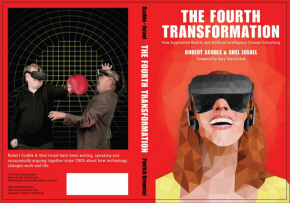 Ten years ago, this book would have been in the science fiction section. In ten years from now, The Fourth Transformation may be in the history section. This is not about things that may happen, but rather changes that have started years ago, and are about to change everything.
Ten years ago, this book would have been in the science fiction section. In ten years from now, The Fourth Transformation may be in the history section. This is not about things that may happen, but rather changes that have started years ago, and are about to change everything.
Robert Scoble and Shel Israel, who provided me an advanced copy of the book, elegantly walk you through The Fourth Transformation of interacting with computers: from text characters (command line) prompts, the Apple and Windows menu interfaces to the touch interface of today’s mobile phones, and to mixed reality: a way of interacting with data, visuals, content and objects in a way that will literally “change everything”. It will move us from “what we carry to what we wear.” More important, the authors clearly explain the recent history, the why and the who that are driving the changes that will disrupt that way we sell, buy, learn, interact, work and play – and give you the insights to the technological and societal implications that will enable you to create your own roadmap.
“It will move technology from what we carry to what we wear. The user interface will move from a screen you tap to computer-generated images that you actually touch and feel. Instead of inputting with our fingers, we will type much faster with
our eyes on virtual keyboards.”
In many ways, the changes ahead will drive better customer engagement and experience, reduce purchasing friction, and makes real-time, active learning and collaboration very, very real and potentially profitable. But in the same way the internet brought changes, some small businesses are likely to grow amazingly large while some large ones may disappear.
It’s a fast read, despite stopping to think about the future unfolding, and the realization that the state: “There’s just too much to gain, and too many smart investors, companies and technologists betting on it, for this future to fizzle”.
That makes this a must read while it’s in the business section, and not the history section.

